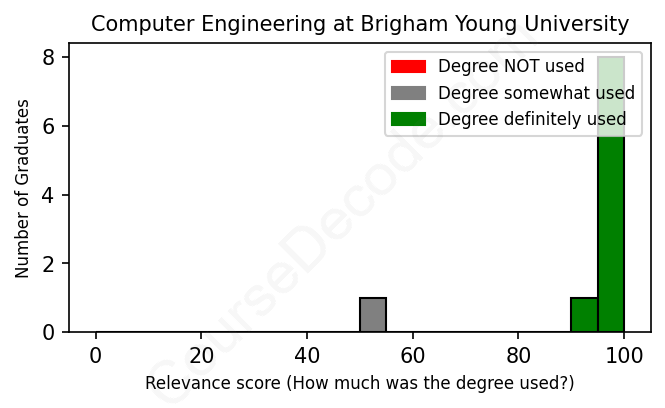
First, some facts. Of the Computer Engineering graduates from Brigham Young University we've analyzed , here's how many have used (or NOT used) their degree in their career:

These are estimates based on AI analysis of 10 LinkedIn profiles (see below).
The verdict? Great! Overall, with an average relevance score of 94%, Computer Engineering graduates from Brigham Young University have a substantially higher likelihood (+27%) of finding work in this field compared to the average graduate across all fields:
And for comparison, here's the chart for all profiles we've looked at across all degrees.
Also, after graduating, 50% of these graduates have pursued further education other than another Bachelor's degree (such as a Masters degree or other), compared to the average across all profiles of 35%. This suggests you may need more than just a Bachelors degree to be competitive as a Computer Engineering graduate.
See the details:
|
Relevance score: 100% We think this person has gone into a career highly relevant to their degree. We think this person has gone into a career highly relevant to their degree.
DEGREE INFOGraduated in 2020 from Brigham Young University with a Bachelor's degree in Computer Engineering. No other secondary education since. JOB HISTORY SINCE GRADUATIONPrincipal Delivery Engineer dexi.io Jun 2020 - Present ABOUTNo information provided. |
The top 10 most common jobs done by the graduates we've analyzed (ranked most common to least) are:
From the analysis of LinkedIn profiles of individuals who graduated with a Computer Engineering degree from Brigham Young University, it's clear that many have landed roles in software engineering and related fields. Positions like Software Engineer, Automation Test Lead, and Firmware Developer appear frequently, showcasing a strong alignment with the technical skills and principles taught in their degree programs. Even roles like Field-Programmable Gate Arrays Engineer and positions at tech companies like Northrop Grumman and Intel Corporation exhibit a clear connection to the core areas of computer engineering, especially in programming, system design, and integration of hardware and software.
However, it's also worth noting that not every position is directly related to traditional computer engineering tasks. For example, some roles, like a Coding and Robotics Instructor or a Scrum Master, while relevant in a broader tech context, focus more on teaching and project management aspects than on the hands-on engineering side. Still, the majority of these graduates are utilizing their skills in ways that are relevant to their training, often making significant contributions to software development or engineering processes. Overall, it appears that a degree in Computer Engineering from BYU sets up graduates quite well for careers that leverage their technical knowledge and skills.
Here is a visual representation of the most common words in job titles for Computer Engineering graduates (this is across all Computer Engineering graduates we've analyzed, not just those who went to Brigham Young University):

From looking at the career trajectories of Brigham Young University graduates in Computer Engineering, it’s clear that many of them have landed solid jobs right after graduation. For their first roles, graduates often start as software engineers, application engineers, or in various specialized positions like Firmware Developers or engineers focusing on specific technologies like Field-Programmable Gate Arrays. For example, recent graduates in 2023 have begun working at reputable companies like Garmin and Raytheon Technologies, which suggests that they’re stepping into positions that align well with their education and skills. Even those who took on teaching roles or internships seem to be using that experience to transition into full-time tech roles, showing a strong partnership between education and industry demand.
As we look five to ten years down the line, the trend continues in a positive direction. Many of these graduates move up into more senior positions, such as Software Engineering leads, senior principal software engineers, or even roles in management like Scrum Masters. It’s not just a few engineers making the climb either; there’s a broad spectrum of roles that develop over time, usually related to technology and software. Overall, it seems that BYU graduates are finding fulfilling careers in tech-related fields, sticking to their engineering roots, and often being promoted as they gain more experience. So, if you’re thinking about a degree in Computer Engineering there, the future looks pretty bright!
Honestly, a Bachelor’s degree in Computer Engineering, like the one at Brigham Young University, can be pretty challenging, but it really depends on your background and interests. You'll dive into a lot of tough subjects like math, circuits, programming, and system design, so it does require a solid commitment and study time. If you love problem-solving and enjoy tech, it might feel more like a fun puzzle at times. That said, many students find certain classes tough and could feel overwhelmed with exams and projects, especially when deadlines stack up. It’s definitely not the easiest degree out there, but if you're passionate about it and stay organized, you can definitely make it through with some hard work!
Most commonly, in the LinkedIn profiles we've looked at, it takes people 4 years to finish a Bachelor degree in Computer Engineering.
It looks like these Computer Engineering grads from Brigham Young University are generally doing pretty well in their careers, and it seems like they’re making decent money. Most of them have landed solid jobs in reputable companies, with a couple even stepping into senior roles or leading positions relatively quickly after graduation. Those working for major organizations like Northrop Grumman or the United States Air Force likely have good financial compensation and benefits. Plus, it’s cool to see graduates getting positions that relate to teaching or applying their skills in research, which often pays fairly well too. Overall, it seems like they’re on a promising path to earning a steady income, so there’s a good chance they'll be in good financial shape as they progress in their careers.
Here is a visual representation of the most common words seen in the "about" section of LinkedIn profiles who have a Bachelor degree in Computer Engineering (this is across all Computer Engineering graduates we've analyzed, not just those who went to Brigham Young University). This may or may not be useful:

Here are all colleges offering a Bachelor degree in Computer Engineering (ordered by the average relevance score of their Computer Engineering graduates, best to worst) where we have analyzed at least 10 of their graduates:
| College | Score | Count |
|---|---|---|
 University of Florida University of Florida
|
95 | 18 |
 Michigan State University Michigan State University
|
94 | 10 |
 Brigham Young University Brigham Young University
|
94 | 10 |
 Penn State University Penn State University
|
92 | 14 |
 California Polytechnic State University-San Luis Obispo California Polytechnic State University-San Luis Obispo
|
91 | 14 |
 University of Central Florida University of Central Florida
|
90 | 14 |
 Georgia Institute of Technology Georgia Institute of Technology
|
90 | 14 |
 Purdue University Purdue University
|
86 | 34 |
 University of Illinois at Urbana-Champaign University of Illinois at Urbana-Champaign
|
86 | 30 |
 Iowa State University Iowa State University
|
86 | 25 |
 Texas A&M University Texas A&M University
|
85 | 17 |
 San Jose State University San Jose State University
|
85 | 16 |
 Clemson University Clemson University
|
85 | 14 |
 Dwarkadas J. Sanghvi College of Engineering Dwarkadas J. Sanghvi College of Engineering
|
85 | 10 |
 North Dakota State University North Dakota State University
|
84 | 12 |
 Savitribai Phule Pune University Savitribai Phule Pune University
|
83 | 25 |
 University of Mumbai University of Mumbai
|
82 | 43 |
 New Jersey Institute of Technology New Jersey Institute of Technology
|
81 | 11 |
 University of North Carolina at Charlotte University of North Carolina at Charlotte
|
79 | 11 |
 California State Polytechnic University-Pomona California State Polytechnic University-Pomona
|
76 | 11 |
 The University of Texas at Dallas The University of Texas at Dallas
|
76 | 18 |
 University of South Florida University of South Florida
|
69 | 10 |
 Gujarat Technological University, Ahmedbabd Gujarat Technological University, Ahmedbabd
|
55 | 13 |